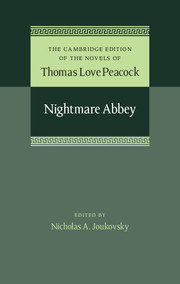Book contents
- Frontmatter
- Contents
- List of Illustrations
- General Editor’s Preface
- Acknowledgements
- Chronology
- List of Abbreviations
- Introduction
- Nightmare Abbey
- Appendix A Peacock’s Preface of 1837
- Appendix B An Essay on Fashionable Literature (1818)
- Appendix C The Four Ages of Poetry (1820)
- Note on the Text
- Emendations and Variants
- Ambiguous Line-End Hyphenations
- Explanatory Notes
- Select Bibliography
Chapter VII
Published online by Cambridge University Press: 30 June 2022
- Frontmatter
- Contents
- List of Illustrations
- General Editor’s Preface
- Acknowledgements
- Chronology
- List of Abbreviations
- Introduction
- Nightmare Abbey
- Appendix A Peacock’s Preface of 1837
- Appendix B An Essay on Fashionable Literature (1818)
- Appendix C The Four Ages of Poetry (1820)
- Note on the Text
- Emendations and Variants
- Ambiguous Line-End Hyphenations
- Explanatory Notes
- Select Bibliography
Summary
A NEW visitor arrived at the Abbey in the person of Mr. Asterias, the ichthyologist. This gentleman had passed his life in seeking the living wonders of the deep through the four quarters of the world: he had a cabinet of stuffed and dried fishes, of shells, sea-weeds, corals, and madrepores, that was the admiration and envy of the Royal Society. He had penetrated into the watery den of the Sepia Octopus, disturbed the conjugal happiness of that turtle-dove of the ocean, and come off victorious in a sanguinary conflict. He had been becalmed in the tropical seas, and had watched, in eager expectation, though unhappily always in vain, to see the colossal polypus rise from the water, and entwine its enormous arms round the masts and the rigging. He maintained the origin of all things from water, and insisted that the polypodes were the first of animated things, and that, from their round bodies and many-shooting arms, the Hindoos had taken their gods, the most ancient of deities. But the chief object of his ambition, the end and aim of his researches, was to discover a Triton and a Mermaid, the existence of which he most potently and implicitly believed, and was prepared to demonstrate, a priori, a posteriori, a fortiori, synthetically and analytically, syllogistically and inductively, by arguments deduced both from acknowledged facts and plausible hypotheses. A report that a mermaid had been seen “sleeking her soft alluring locks” on the sea-coast of Lincolnshire, had brought him in great haste from London, to pay a long-promised and often-postponed visit to his old acquaintance, Mr. Glowry.
Mr. Asterias was accompanied by his son, to whom he had given the name of Aquarius,—flattering himself that he would, in the process of time, become a constellation among the stars of ichthyological science. What charitable female had lent him the mould in which this son was cast, no one pretended to know; and, as he never dropped the most distant allusion to Aquarius's mother, some of the wags of London maintained that he had received the favours of a mermaid, and that the scientific perquisitions which kept him always prowling about the sea-shore, were directed by the less philosophical motive of regaining his lost love.
- Type
- Chapter
- Information
- Nightmare Abbey , pp. 42 - 51Publisher: Cambridge University PressPrint publication year: 2016

